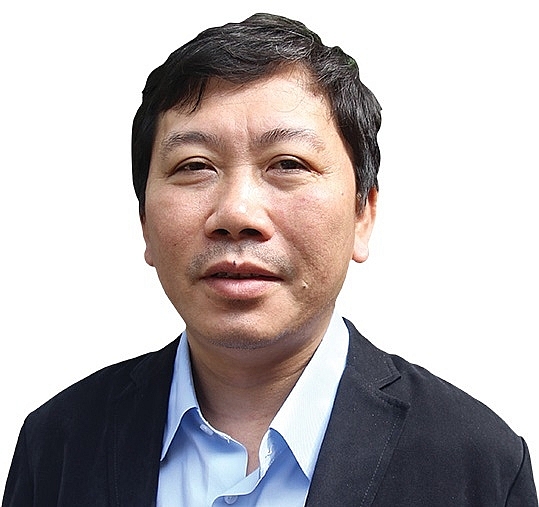PPPs bringing enterprises and cooperatives together
How do you evaluate the livelihood support that corporations offer to farmers in Vietnam?
 |
| Dr. Nguyen Do Anh Tuan, director of the International Cooperation Department under the Ministry of Agriculture and Rural Development |
Vietnam is integrating deeply into global markets, and with that come new opportunities and new demands, as customers and partners are increasingly applying additional social and environmental standards.
So far, the private sector has been very active in supporting with market access, new technologies, and guidance for new standards of import markets, while cooperating with the public sector to support Vietnamese farmers in connecting with the global markets. For example, some companies have been introducing new technologies to reduce production costs, emissions, and required resources like seeds, manure, and water.
Moreover, the private sector has helped farmers to meet hygiene, safety, and quality standards for agricultural products, as well as maintain environmental sustainability and product variety for newly-opened markets, such as within a series of new-generation free trade agreements.
The efficiency of such cooperation is also tallying with the work between international donors. How much pressure is there on government agencies?
As there is close cooperation between these partners, there is not much pressure on government agencies. We have cooperated with major donors, such as Bayer, Nestlé, Unilever, and many more, to bring out suitable advantages for farmers as well as published a set of guidelines for sustainable farming and through the agricultural extension system.
Currently, the private sector is particularly active in raw material acquisition, the establishment of new processing facilities, and preliminary processing and preservation methods. Some examples here are Nafoods Group, TH Group, and Doveco, who all promote processing technologies and raise added values, thus helping to stabilise the market for Vietnamese agricultural products.
What role has the cooperative model played in public-private partnerships (PPP) recently?
A very important one, especially when it comes to gathering farmers and making products that are consistent with the required market standards. If each farmer only produces on their own, the consistency of product quality cannot be ensured as their scale is insufficient, and they usually lack time to deliver their goods.
Most crucial is the connection between cooperatives and businesses. Now, cooperatives not only represent farmers but also must be able to implement market directions of associated businesses. Thus, the role of a cooperative’s leader is vital.
Therefore, with the current PPP models, we are trying out several new models that bring enterprises and cooperatives closer together, so that they can update farmers on market requirements, new ways to organise their work, and reduce production costs while increasing efficiency.
What lessons have been learnt from implementing the PPP model in agriculture?
There have been many important lessons. For instance, it is necessary to have very active participation of all stakeholders as one party cannot improve anything on its own. We also learnt that the public sector has its own strengths, while the private sector has advantages in capacity building and business performance following sustainable market standards.
What further policies does Vietnam want to apply to further attract the private sector?
The government has introduced many policies and decrees to attract investment in agricultural and rural development and encourage various forms of cooperation in the sector.
As Vietnam is increasingly integrating itself into global markets, our nation needs to strongly direct policies towards new market requirements, such as product and quality standards, processes to ensure sustainable production, and new safety standards. To do so, our country must regularly update itself and apply necessary measures to fulfil the actual requirements of the market.
Many forecasts show that processed products will have greater demand, as the pandemic’s development remains uncertain. Therefore, Vietnam should prioritise policies and promote relations with partners that focus more on processing and developing products with longer preservation.
Vietnam also needs to consider further adopting digital technology to minimise the negative impact of market breakdowns and disrupted value chains, such as by emphasising online distribution policies.
What the stars mean:
★ Poor ★ ★ Promising ★★★ Good ★★★★ Very good ★★★★★ Exceptional
Related Contents
Latest News
More News
- $100 million initiative launched to protect forests and boost rural incomes (January 30, 2026 | 15:18)
- Trung Nam-Sideros River consortium wins bid for LNG venture (January 30, 2026 | 11:16)
- Vietnam moves towards market-based fuel management with E10 rollout (January 30, 2026 | 11:10)
- Envision Energy, REE Group partner on 128MW wind projects (January 30, 2026 | 10:58)
- Vingroup consults on carbon credits for electric vehicle charging network (January 28, 2026 | 11:04)
- Bac Ai Pumped Storage Hydropower Plant to enter peak construction phase (January 27, 2026 | 08:00)
- ASEAN could scale up sustainable aviation fuel by 2050 (January 24, 2026 | 10:19)
- 64,000 hectares of sea allocated for offshore wind surveys (January 22, 2026 | 20:23)
- EVN secures financing for Quang Trach II LNG power plant (January 17, 2026 | 15:55)
- PC1 teams up with DENZAI on regional wind projects (January 16, 2026 | 21:18)

 Tag:
Tag:




















 Mobile Version
Mobile Version